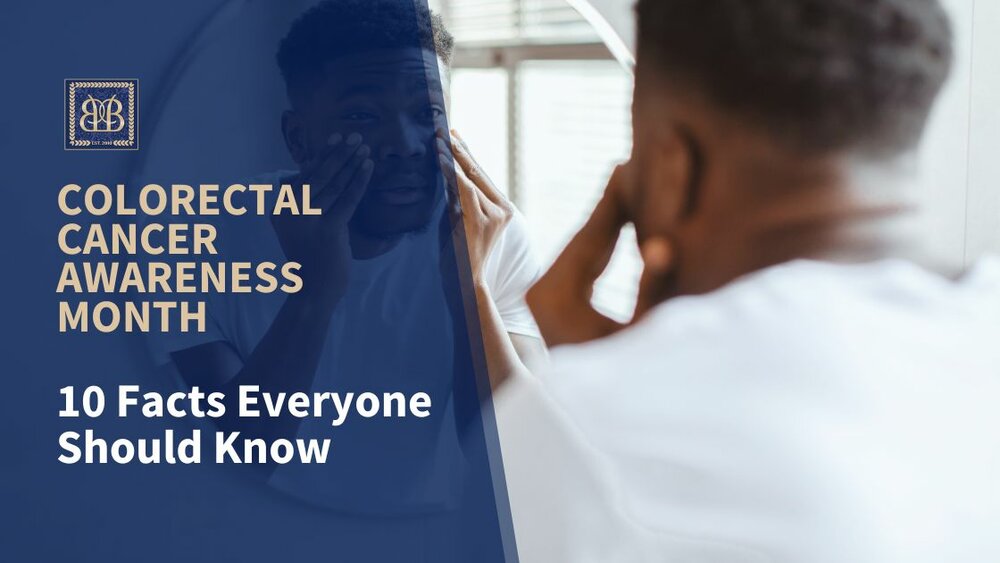Colorectal Cancer Awareness Month: 10 Facts Everyone Should Know
March is Colorectal Cancer Awareness Month, a time to highlight the importance of screening, prevention, and early detection.
Colorectal cancer is the second deadliest cancer in the U.S., yet it is also one of the most preventable and treatable when it’s caught early. Unfortunately, many people delay or skip screenings, increasing their risk of late-stage diagnosis. By raising awareness and encouraging regular screenings, we can help save lives. In this article, we will explore the significance of Colorectal Cancer Awareness Month, the impact of colorectal cancer, why early detection is critical, and the proactive steps you can take to lower your risk.
Colorectal Cancer and the Black Community
Black Americans are 20% more likely to develop colorectal cancer and 40% more likely to die from it compared to most other racial and ethnic groups. This disparity is due to several factors, including:
- Limited access to screenings and early detection services
- Higher rates of underlying health conditions that increase risk
- Systemic healthcare disparities
Raising awareness, improving access to screenings, and advocating for healthcare equity are crucial steps in reducing this disparity.
10 Key Facts and Prevention Tips for Colorectal Cancer
1. Colorectal cancer is the second leading cause of cancer deaths nationwide.
Colorectal cancer claims over 50,000 lives each year in the U.S. However, with early detection and prevention efforts, thousands of deaths could be prevented.
2. It affects men and women equally.
Both men and women are at risk for colorectal cancer, and the lifetime risk is about 4–5%. While age is a significant factor, cases among younger adults are rising and cases among older Americans are declining.
3. Family history increases your risk.
If you have a first-degree relative (parent, sibling, or child) with colorectal cancer, your risk is two to five times higher. Certain genetic conditions, like Lynch syndrome, can greatly increase risk, so genetic testing may be recommended for high-risk families.
4. You can have colorectal cancer without symptoms.
Many people do not experience symptoms in the early stages of colorectal cancer. However, possible warning signs include:
- Changes in bowel habits (diarrhea, constipation, or narrow stools)
- Blood in the stool or rectal bleeding
- Unexplained weight loss
- Persistent abdominal pain or cramping
- Fatigue or weakness
5. Screening can prevent colorectal cancer.
Most colorectal cancers develop from polyps—small growths in the colon or rectum. Screening tests, like colonoscopies, can detect and remove these polyps before they become cancerous.
6. Colonoscopy remains the most effective screening test.
While there are several screening options (including stool-based tests and virtual colonoscopy), colonoscopy is the only test that allows doctors to examine the entire colon and remove polyps during the same procedure. It can reduce cancer risk by 90%.
7. Screening is now recommended at age 45.
Due to rising cases in younger adults, screening guidelines have changed. People at average risk should start screening at age 45 (previously 50). If you have a family history or other risk factors, screening may need to start even earlier.
8. Early detection saves lives.
When caught early, colorectal cancer has a 90% five-year survival rate. However, if detected in later stages, survival rates drop significantly.
9. Many people skip screenings.
Despite its life-saving benefits, nearly half of eligible Americans are not up to date on colorectal cancer screenings. Lack of awareness, fear, and healthcare access barriers are common reasons for delayed screenings.
10. Healthy lifestyle choices can lower your risk.
You can reduce your risk of colorectal cancer by:
- Eating more fiber-rich foods (vegetables, fruits, whole grains)
- Limiting red meat and processed foods
- Exercising regularly
- Avoiding tobacco and excessive alcohol
- Maintaining a healthy weight
Colorectal Cancer Awareness Month is a reminder that early detection saves lives. If you're 45 or older, talk to your doctor about getting screened. If you’re younger but have a family history or other risk factors, discuss whether earlier screening is right for you. Don’t wait—getting checked could save your life or the life of someone you love.
As we observe Colorectal Cancer Awareness Month, let’s honor and support those affected by this disease. Whether through early detection, education, or compassionate care, every action counts. If you or a loved one needs support, please reach out to us—we are here for you.
About Batchelor Brothers Funeral Services: As a leading African American-owned and operated funeral and cremation organization, Batchelor Brothers Funeral Services has provided a ministry of care to thousands of grieving families. We promise to provide our highest level of distinguished service and respect to families who entrust us to honor their loved ones. With two convenient locations serving North and West Philadelphia, it is always our pleasure to be of service. For more information about our funeral, cremation, memorial, repast, and grief counseling services, please visit batchelorbrothers.com.







Comments